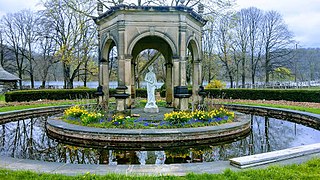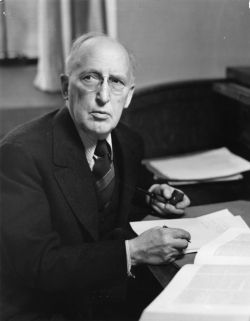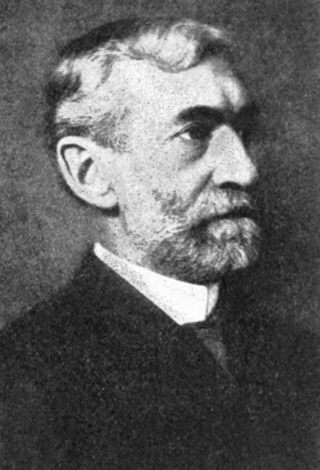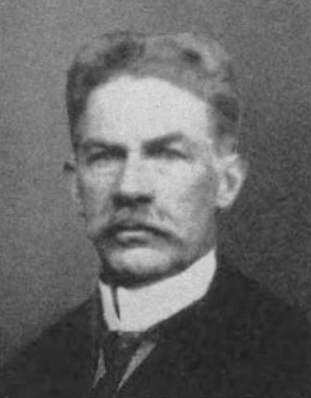
Charles Burton Gulick (born September 30, 1868, in Jersey City, New Jersey; died May 23, 1962, in White Plains, New York) was an American classical philologist. He taught at Harvard University from 1892 to 1937. [1]

Charles Burton Gulick (born September 30, 1868, in Jersey City, New Jersey; died May 23, 1962, in White Plains, New York) was an American classical philologist. He taught at Harvard University from 1892 to 1937. [1]
Charles Burton Gulick, son of traveling salesman Horace Gulick and his wife Anna Louise Sillcocks Gulick, studied classical philology at Harvard University. He earned his bachelor's degree in 1890 and his master's degree in 1891. In 1890, he was awarded a Bowdoin Prize for a translation into attic prose. [2] Following this, he traveled to Germany and Greece for further study. Gulick spent his entire academic career at Harvard, starting as an instructor in Greek in 1892. In 1894, he earned his doctorate and was promoted to assistant professor. He became a full Professor of Greek in 1909 and was appointed Eliot Professor of Greek in 1925. Additionally, he served as a visiting professor at the American School of Classical Studies at Athens in 1911–1912, President of the Classical Association of New England in 1928–1929, and President of the American Philological Association in 1929–1930. Gulick retired in 1937 due to deteriorating eyesight, which forced him to give up his academic work. [3] [1]
Gulick was interested in various aspects of Greek culture. He wrote two books on the private life of the Greeks and a bilingual edition of Athenaeus' "Deipnosophistae" for the Loeb Classical Library in 1927. With his considerable proficiency in the Greek language, he was able to revise the Greek grammar of his senior colleague, William Watson Goodwin, in 1930. [3]
In 1913, he was elected to the American Academy of Arts and Sciences, and in 1940, to the American Philosophical Society. [3]
Didymus Chalcenterus was an Ancient Greek scholar and grammarian who flourished in the time of Cicero and Augustus.

In Greek mythology, Harmonia is the goddess of harmony and concord. Her Roman counterpart is Concordia. Her Greek opposite is Eris, whose Roman counterpart is Discordia.

Basil Lanneau Gildersleeve was an American classical scholar. An author of numerous works, and founding editor of the American Journal of Philology, he has been credited with contributions to the syntax of Greek and Latin, and the history of Greek literature.

The Deipnosophistae is an early 3rd-century AD Greek work by the Greek author Athenaeus of Naucratis. It is a long work of literary, historical, and antiquarian references set in Rome at a series of banquets held by the protagonist Publius Livius Larensis for an assembly of grammarians, lexicographers, jurists, musicians, and hangers-on.

Carl Darling Buck was an American philologist.

William Gardner Hale was an American classical scholar.

In Greek mythology, Chrysippus was a divine hero of Elis in the Peloponnesus (Greece), sometimes referred to as Chrysippus of Pisa.

James Bradstreet Greenough was an American classical scholar.

William Watson Goodwin was an American classical scholar, for many years Eliot professor of Greek at Harvard University.
Charles Edwin Bennett was an American classical scholar and the Goldwin Smith Professor of Latin at Cornell University. He is best remembered for his book New Latin Grammar, first published in 1895 and still in print today.

Emily Dickinson Townsend Vermeule was an American classical scholar and archaeologist. She was a professor of classical philology and archaeology at Harvard University.
David Roy Shackleton Bailey was a British scholar of Latin literature who spent his academic life teaching at the University of Cambridge, the University of Michigan, and Harvard. He is best known for his work on Horace, and Cicero, especially his commentaries and translations of Cicero's letters.

Paul Shorey was an American classical scholar.

Herbert Weir Smyth was an American classical scholar. His comprehensive grammar of Ancient Greek has become a standard reference on the subject in English, comparable to that of William Watson Goodwin, whom he succeeded as Eliott Professor of Greek Literature at Harvard University.

John Henry Wright was an American classical scholar born at Urumiah (Rezaieh), Persia. He earned his Bachelors (1873) and Masters (1876) at Dartmouth College, New Hampshire. After junior appointments in 1886 he joined Johns Hopkins as a professor of classical philology. In 1887, he became a professor of Greek at Harvard, where, from 1895 to 1908, he was also Dean of the Graduate School of Arts and Sciences.

In Greek mythology, Glaucus was a Greek prophetic sea-god, born mortal and turned immortal upon eating a magical herb. It was believed that he came to the rescue of sailors and fishermen in storms, having earlier earned a living from the sea himself.
Charles Farwell Edson Jr. (1905–1988) was an American scholar of Ancient History.
Charles Forster Smith was an American classical philologist, who focused on the ancient Greek historian Thucydides.

Edward Capps Sr. was an American diplomat, professor of Philology, and colonel.
The Halieia or Halia was one of the principal festivals celebrated on the island of Rhodes in honour of their patron god Helios, the Sun. It was held every year in summer, with gymnic and musical contests and a great procession.